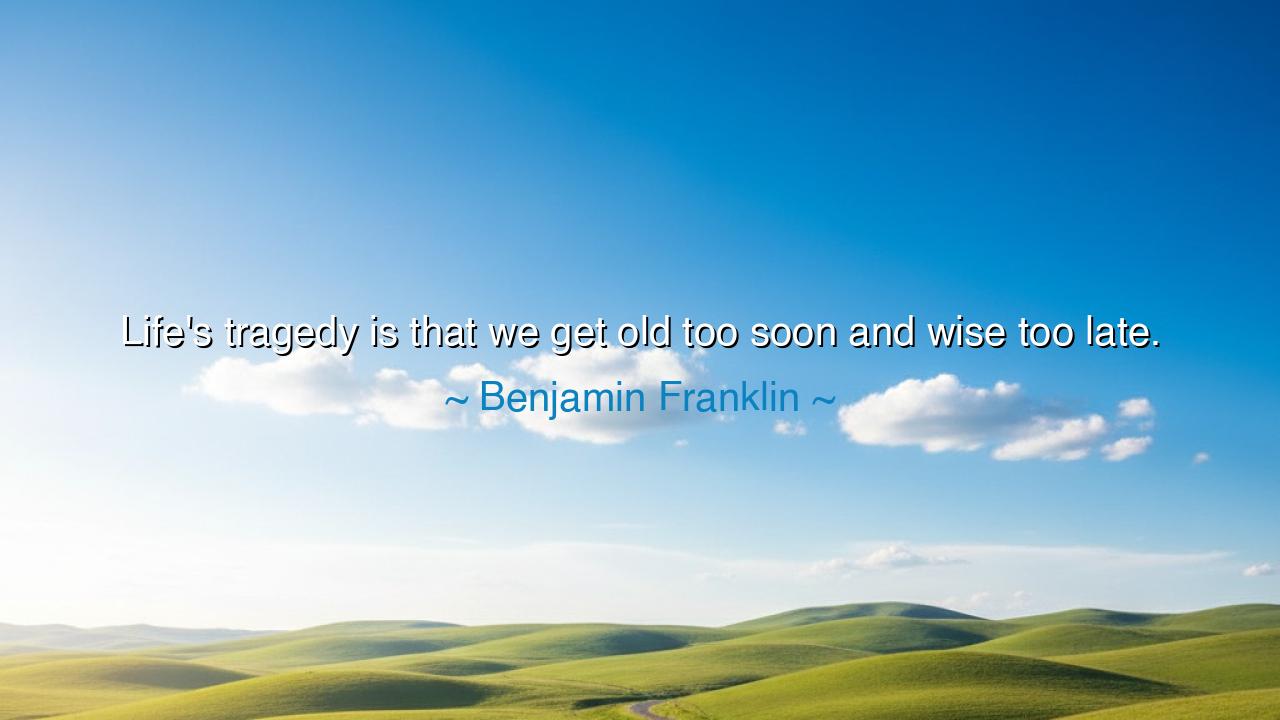
Life's tragedy is that we get old too soon and wise too late.






"Life's tragedy is that we get old too soon and wise too late." These words from Benjamin Franklin strike at the heart of one of the greatest ironies of the human experience. As we walk through life, we are often confronted with the reality that youth, with all its vigor and ambition, fades too quickly, while wisdom, that elusive treasure, seems to arrive only after much of our energy has dissipated. In youth, we are eager to achieve, to conquer, to explore, and to make our mark upon the world. Yet, it is not until we are older, when time has taught us its many lessons, that we come to realize how precious those moments of youth truly were. The tragic truth that Franklin speaks of is that in growing older, we gain insight, but often at the cost of the strength and vitality needed to act upon that newfound knowledge.
The ancients knew well the cost of time. In Greek philosophy, the elder was often revered not for their physical strength but for their wisdom. Socrates, in his later years, spoke often of the pursuit of truth and virtue, not as a youthful quest, but as a lifelong journey. He warned that life is fleeting, and that it is in the latter years, after a lifetime of learning and reflecting, that we gain the kind of knowledge that can truly guide us. Yet, just as Franklin observed, this wisdom came only after much time had passed—time during which the body had aged, and the energy of youth had been spent. Thus, there is a great paradox in the human condition: we search for wisdom, but by the time we have it, the opportunity to act with the strength of our youth has diminished.
Consider the example of Leonardo da Vinci, one of history's most celebrated geniuses. In his early years, da Vinci was filled with a fiery curiosity, exploring many fields of study—art, engineering, anatomy, and more. His brilliance shone in his youth, yet much of his most profound work was created in his later years, when his mind had matured and his understanding of the world had deepened. In his mature years, da Vinci became not only a master artist, but a visionary whose ideas for machines, architecture, and even human anatomy were far ahead of his time. But the strength of youth, the ability to carry out those ideas, had faded, and many of his inventions were never realized in his lifetime. His story echoes Franklin’s lament: wisdom arrived too late, while the energy to manifest that wisdom had already slipped away.
This tragic cycle is not unique to da Vinci but is echoed throughout history. Albert Einstein, the great physicist, spent his youth filled with revolutionary ideas, but it was only in his later years that he was able to articulate his theory of relativity, transforming the scientific world. Like Leonardo, Einstein had the vision, but as he aged, he also faced the physical limitations of a body that could no longer keep pace with his mind. The wisdom he gained over time had the power to change the world, yet he often spoke of the frustrations of knowing that his most significant contributions came as he grew older. Life’s tragedy is that we all, in our own way, experience this dissonance between youthful energy and mature wisdom.
The lesson of Franklin's words is simple but profound: the greatest gift of life is the time we are given to learn, and yet, the tragedy is that we often do not have enough time to apply that learning when we have acquired it. In our youth, we have the vigor and strength to change the world, but it is only through the passage of time that we gain the wisdom to understand what truly matters. This irony urges us to reflect deeply on how we use our time. In our youth, we must not squander the precious energy we have, but instead direct it toward meaningful learning and self-development. In our older years, we must find ways to channel the wisdom we have gained into action, even if we no longer have the same vitality of our youth.
The key lesson here is that wisdom is not meant to be delayed; it is not something we should wait for but something we must cultivate early. To do this, we must balance the energies of youth with the reflection of age. Let us strive to learn continually, to seek growth with every passing day, so that when the wisdom of the years arrives, we can apply it immediately, with the strength of both youth and experience. As Franklin suggests, the key to avoiding the tragedy of this cycle is to learn early to live with purpose, making each moment count in the pursuit of both knowledge and action.
Let us then reflect on how we live each day, recognizing that wisdom is not something to be earned only in the later stages of life. We must seek it early, so that, as we grow older, we have the strength and the purpose to act upon the knowledge we have gained. Let us take Franklin’s words to heart, and make the most of our time on this earth, for wisdom, like all precious things, is a treasure earned through the slow and steadfast work of a lifetime.






AAdministratorAdministrator
Welcome, honored guests. Please leave a comment, we will respond soon